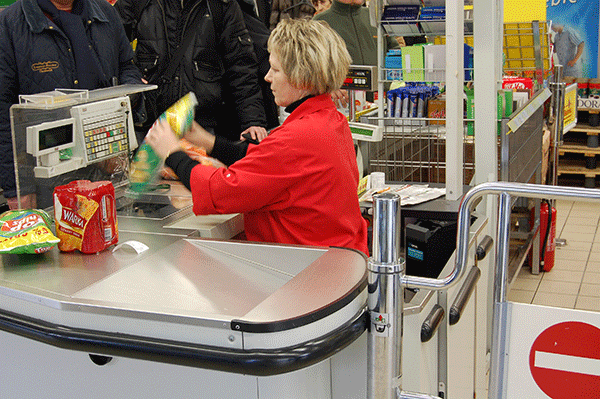With Fairtrade Fortnight kicking off this week, we are encouraged to vote with our wallets, to recognise and reward the people behind the food we eat and the coffee we drink.
Fairtrade often, and rightly, focuses on the unfair ways that distant workers are treated, but data revealing that supermarkets have some of the most unequal pay distributions of any UK company are a stark reminder to also pay attention to unfair trade closer to home.
Last year, large UK companies were, for the first time, required to report not only how much their chief executive earns, but also how that figure compares with what their employees earn. The High Pay Centre analysed that data in a report released late last year, finding that three major UK supermarkets had some of the most unequal pay ratios in the country.
For example, chief executive of Tesco, Ken Murphy, earned 305 times as much in the 2019/20 financial year as the firm’s median employee; that means that by the end of 2nd of January, depending on what calculation you use, he had already earned more than his average worker would all year.
This matters. A large body of research demonstrates that, regardless of its GDP, a country’s degree of inequality is strongly linked with social and health problems, including poor educational outcomes and increased violence.
According to Dr Madeleine Power, a researcher at the University of York, the stigmatisation and other psychological traumas that poorer people in more unequal societies endure causes stress, which leads to physical as well as mental ill-health.

But there is an even simpler moral argument to be made.
“It’s just wrong,” says Dr Lindy Sharpe, a research fellow at the Centre for Food Policy, City University of London. “If two people work for the same organisation, and one is 400 times better rewarded than the other, is it reasonable to think that one person is so much more ‘valuable’ than the other?”
Loaf, a bakery in the Stirchley neighbourhood of Birmingham, is a workers’ cooperative with a flat pay structure. All nine of Loaf’s workers are company directors, all of whom receive the same £9.50 per hour real Living Wage.
The flat pay structure has led to a more positive work environment, says Nancy Langfeldt, one of Loaf’s directors. “Everybody feels comfortable that they’re valued equally.” Loaf’s worker-directors have also been able to collectively decide to prioritise other benefits, like paid parental leave, over higher wages.
“It just feels fairer – because it is,” says Philip Roberts, another of Loaf’s directors.
Labour rights advocates, like those behind the Living Wage campaign, have long demanded higher remuneration for the UK’s lowest-paid workers. But in the food system, these demands trigger retorts that this would only lead to unacceptably high food prices, or to farmers being forced out of business as their margins are squeezed ever tighter.
“Labour has always been the thing that has to be low-cost in order for cheap food to stay cheap,” says Sharpe. If that’s true, then maybe critics of raising the minimum wage are right, and doing so would push up the price of food.

But who does cheap food really serve?
A study has found that households with an annual income below £21,249 are at a higher risk of food insecurity. The lowest-paid quarter of employees in all three of the supermarkets featured in the High Pay Centre’s report received less than this amount.
“A lot of low-paid workers in the food system, including so-called ‘unskilled workers’ in supermarkets, will be in receipt of’ top-up benefits,” says Sharpe, “so the state is subsidising these low wages.”
It’s something of a catch-22. Wages are low to keep food cheap and, so the argument goes, affordable; but, in order to keep prices so low, the workers producing and distributing that food are paid so little that they still can often not afford it. This forces them to turn to government aid or to charitable institutions such as the Trussell Trust (often provisioned through donations from the supermarkets themselves) to avoid going hungry.
This situation may be less of a paradox than it first appears, though. The gulf between supermarket CEO pay and that of the least well-paid employees is at least a partial explanation. According to the High Pay Centre, a fairer distribution of wages within companies could, in many cases, go a long way toward solving the problem.

At Growing Communities, a London veg box scheme and farmers market, all employees are paid at least the real London Living Wage (£10.85 per hour), and no more than twice that.
According to director Julie Brown, this is partly a means of addressing the cheap food/low wages dilemma. By placing a cap on salaries, Growing Communities can make sure the food it sells is affordable, that its workers are fairly paid, and that the farmers it buys from are fairly compensated.
But across the food system and the economy at large, redistributing income within individual organisations will not be enough. Other economic factors, such as the high cost of housing or the welfare system, may also need to be transformed.
“Equal wages would be an improvement,” says Langfeldt, “but it wouldn’t really transform the nature of that business – it would just kind of change the ratios of the extraction of profit.”
On the other hand, even small acts like these by individual organisations are vital. As Power puts it: “Because they change the discourse, change the mindset—they show what’s possible.”










0 Comments